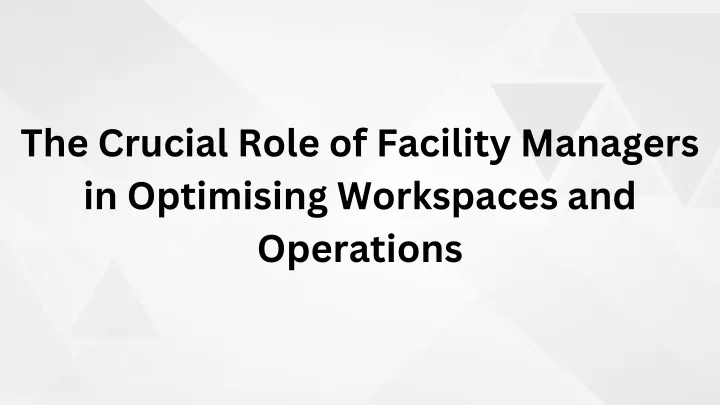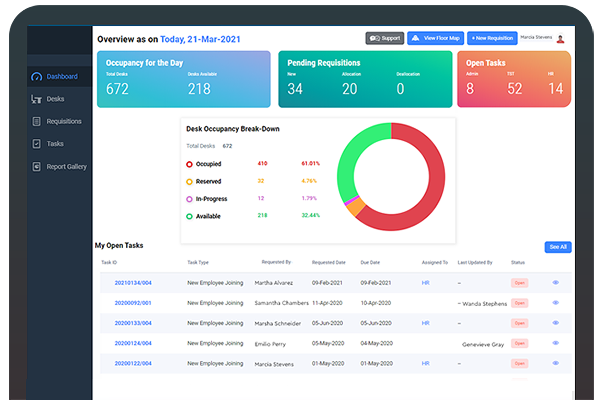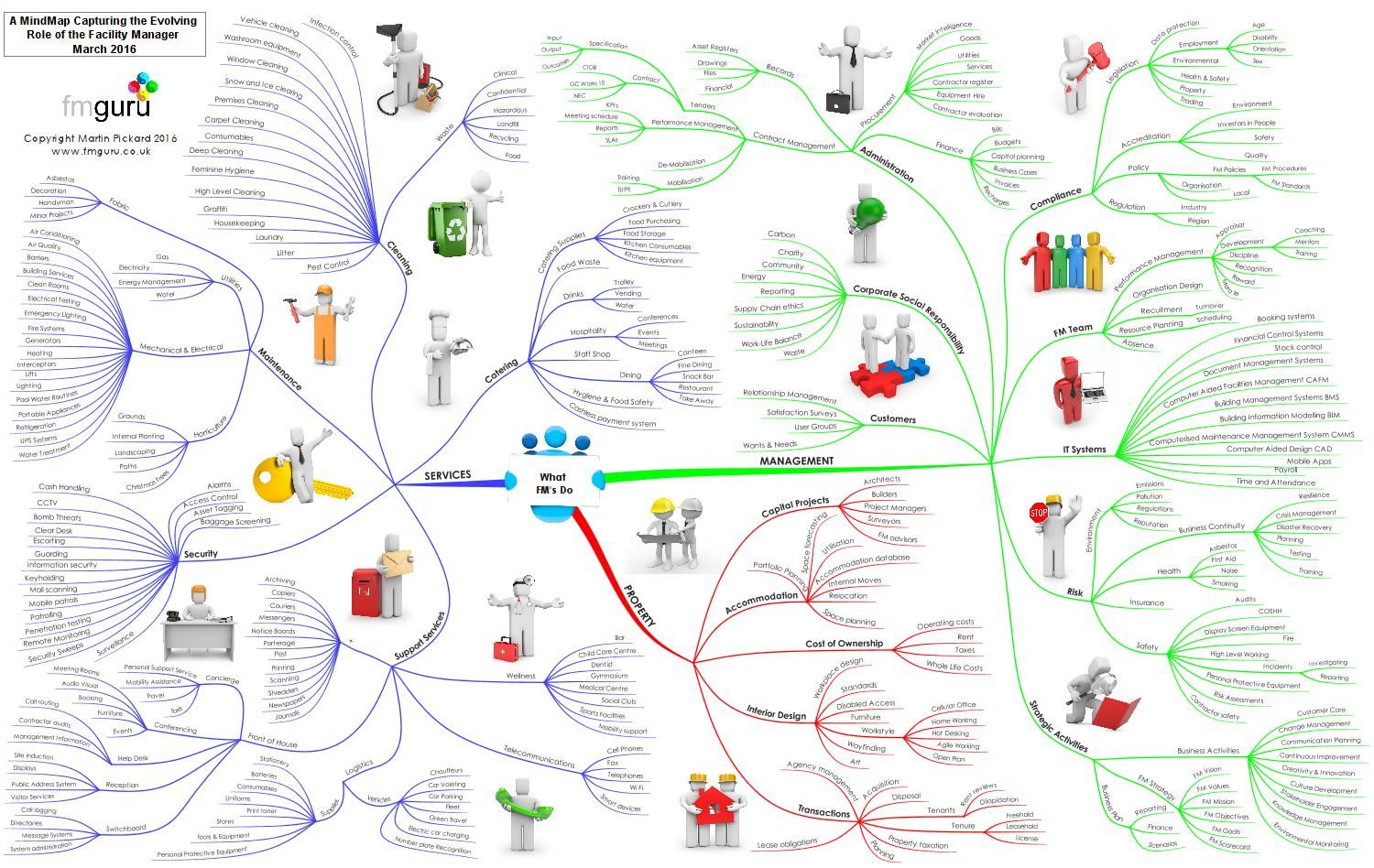Facilities Managers Role Explained

Introduction to Facilities Management

Facilities management is a critical aspect of any organization, responsible for ensuring the smooth operation of buildings, services, and equipment. The facilities manager plays a vital role in maintaining a safe, healthy, and productive environment for employees, customers, and visitors. In this blog post, we will delve into the world of facilities management, exploring the facilities manager’s role, responsibilities, and the skills required to excel in this position.
What is a Facilities Manager?

A facilities manager is a professional responsible for overseeing the maintenance, operation, and upkeep of an organization’s buildings, facilities, and equipment. They ensure that all aspects of the facility are running efficiently, safely, and effectively, providing a supportive environment for the organization to achieve its goals. Facilities managers work in various industries, including commercial, industrial, educational, healthcare, and government sectors.
Key Responsibilities of a Facilities Manager

The facilities manager’s role is diverse and encompasses a wide range of responsibilities, including: * Maintenance and repairs: Ensuring that all equipment, buildings, and facilities are well-maintained and repaired promptly to prevent downtime and minimize disruptions. * Facilities planning: Developing and implementing plans for new facilities, renovations, and upgrades to meet the organization’s growing needs. * Space management: Optimizing the use of space, including allocating rooms, managing inventory, and ensuring compliance with safety regulations. * Health and safety: Implementing and enforcing health and safety policies, procedures, and regulations to protect employees, customers, and visitors. * Energy and utilities management: Monitoring and controlling energy consumption, water usage, and waste management to minimize the organization’s environmental impact. * Budgeting and cost control: Managing budgets, tracking expenses, and identifying areas for cost savings to ensure the efficient use of resources. * Contract management: Negotiating, managing, and monitoring contracts with suppliers, vendors, and service providers to ensure compliance with organizational requirements. * Emergency preparedness: Developing and implementing emergency response plans, including evacuation procedures, fire safety, and business continuity planning.
Skills Required for a Facilities Manager

To succeed as a facilities manager, individuals should possess a combination of technical, business, and interpersonal skills, including: * Strong communication and interpersonal skills: Ability to effectively communicate with employees, stakeholders, and vendors to ensure seamless operations. * Technical knowledge: Familiarity with building systems, maintenance procedures, and equipment operation to ensure efficient troubleshooting and problem-solving. * Business acumen: Understanding of financial management, budgeting, and cost control to make informed decisions and optimize resource allocation. * Problem-solving and analytical skills: Ability to analyze problems, identify solutions, and implement effective remedies to minimize disruptions and ensure business continuity. * Leadership and management skills: Ability to lead and manage teams, including supervisors, technicians, and contractors, to achieve organizational goals.
Facilities Management Tools and Technologies

Facilities managers utilize various tools and technologies to streamline operations, improve efficiency, and reduce costs. Some of these tools include: * Computer-aided facilities management (CAFM) software: Integrated platforms for managing facilities, maintenance, and operations. * Building information modeling (BIM): Digital representations of buildings and facilities to facilitate planning, design, and operations. * Internet of Things (IoT) devices: Sensors, meters, and other devices that provide real-time data on energy consumption, water usage, and equipment performance. * Mobile apps: Platforms for reporting maintenance requests, tracking work orders, and accessing facilities information on-the-go.
📝 Note: Facilities managers must stay up-to-date with the latest technologies and trends to optimize their operations and provide a competitive edge for their organizations.
Best Practices for Facilities Management

To ensure effective facilities management, organizations should adopt the following best practices: * Develop a comprehensive facilities management plan: Outline goals, objectives, and strategies for maintaining and improving facilities. * Conduct regular maintenance and inspections: Identify and address potential issues before they become major problems. * Implement energy-efficient practices: Reduce energy consumption, water usage, and waste to minimize environmental impact. * Foster a culture of safety and wellness: Promote a healthy and safe work environment through training, education, and awareness programs. * Monitor and evaluate performance: Track key performance indicators (KPIs) and adjust strategies to optimize facilities management operations.
Challenges Facing Facilities Managers

Facilities managers face various challenges, including: * Budget constraints: Managing limited resources and prioritizing spending to meet organizational needs. * Regulatory compliance: Ensuring adherence to laws, regulations, and industry standards. * Technological advancements: Staying up-to-date with the latest technologies and trends to optimize operations. * Changing workforce demographics: Adapting to shifting workforce needs, including generational differences and diverse work styles. * Sustainability and environmental concerns: Balancing organizational needs with environmental responsibilities and social expectations.
Future of Facilities Management

The future of facilities management will be shaped by technological advancements, changing workforce demographics, and growing concerns for sustainability and environmental responsibility. Facilities managers must be prepared to adapt to these changes and leverage new technologies, such as artificial intelligence, blockchain, and the Internet of Things (IoT), to optimize operations and create a competitive edge for their organizations.
As we move forward, it is essential to recognize the critical role facilities managers play in maintaining a safe, healthy, and productive environment for employees, customers, and visitors. By understanding the facilities manager’s role, responsibilities, and the skills required to excel in this position, organizations can better support their facilities management teams and create a positive, supportive work environment that fosters growth, innovation, and success.
In summary, the facilities manager’s role is multifaceted and critical to the success of any organization. By adopting best practices, leveraging technology, and staying up-to-date with the latest trends and advancements, facilities managers can optimize operations, reduce costs, and create a competitive edge for their organizations. As the facilities management landscape continues to evolve, it is essential to recognize the importance of this role and provide the necessary support and resources to ensure the continued success of facilities management teams.
What is the primary role of a facilities manager?

+
The primary role of a facilities manager is to oversee the maintenance, operation, and upkeep of an organization’s buildings, facilities, and equipment, ensuring a safe, healthy, and productive environment for employees, customers, and visitors.
What skills are required to be a successful facilities manager?

+
A successful facilities manager should possess a combination of technical, business, and interpersonal skills, including strong communication and problem-solving abilities, technical knowledge, business acumen, and leadership skills.
What are some of the challenges facing facilities managers?

+
Facilities managers face various challenges, including budget constraints, regulatory compliance, technological advancements, changing workforce demographics, and growing concerns for sustainability and environmental responsibility.
How can facilities managers stay up-to-date with the latest technologies and trends?

+
Facilities managers can stay up-to-date with the latest technologies and trends by attending industry conferences, participating in online forums and discussions, and pursuing ongoing education and training opportunities.
What is the future of facilities management?

+
The future of facilities management will be shaped by technological advancements, changing workforce demographics, and growing concerns for sustainability and environmental responsibility, requiring facilities managers to adapt and leverage new technologies to optimize operations and create a competitive edge for their organizations.



